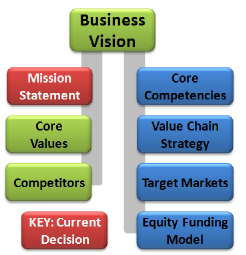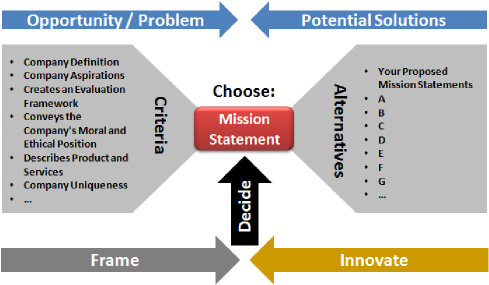Choosing your business mission statement is an important part of establishing your business identity
The business mission statement should define the company and what it desires to be. It should identify the fundamental purpose for the organization. This can be difficult to achieve in a brief statement, but doing this well can ensure that your key stakeholders get a quick and concise understanding of what your company is about.
Evaluating your Mission Statement Alternatives
 Begin with the end in mind. Before selecting alternatives to consider for your mission statement, start by defining what criteria you will use to make the best selection.
Begin with the end in mind. Before selecting alternatives to consider for your mission statement, start by defining what criteria you will use to make the best selection.
Here are some of the criteria that we used, in priority order, in choosing our business mission statement. (See our mission statement example)
Company Definition
The mission statement should define what the company is. It should state the fundamental purpose of the organization.
Company Aspirations
The mission statement should define what the company aspires to be. It should suggest what you want to be remembered for.
Creates an Evaluation Framework
The mission statement should provide a framework to evaluate current activities. It should provide a compass for decision making. If your mission won't influence the strategic and daily decisions of your company, don't bother. Your customers and employees will be confused when actions don't align with the words in your mission.
Conveys the Company's Moral and Ethical Position
The mission statement should convey the moral and ethical position of the organization. It should provide direction for doing the right things.
Describes Product and Services
The business mission statement should convey the types of products and services that your firm provides.
Company Uniqueness
The mission statement should distinguish your company from all others. Use your mission to tell your customers how you are different from competitors and as an opportunity to inspire employees with your unique vision.

Other criteria to consider
Depending on what's important to your business, there are a number of other criteria you might want to consider in developing your mission statement. The mission statement might identify the customers, opportunities, and geography that the company will serve. A business mission statement should be concise, clear, and easily understood.
When considering your employees, you mission should inspire their commitment. Try to use energy words. It should also be broad enough to allow for creative growth.
When thinking about investors, your mission statement could provide a view on performance expectations for the company. Finally, a mission statement should not use technical language that is meaningless to the outside world. In other words, no jargon!
Mission Statement Examples
Now that you have the evaluation criteria, it's up to you to create some compelling alternatives for your company's mission. Follow this link to get to a wide range of business mission statement examples that you can use as starting points.

